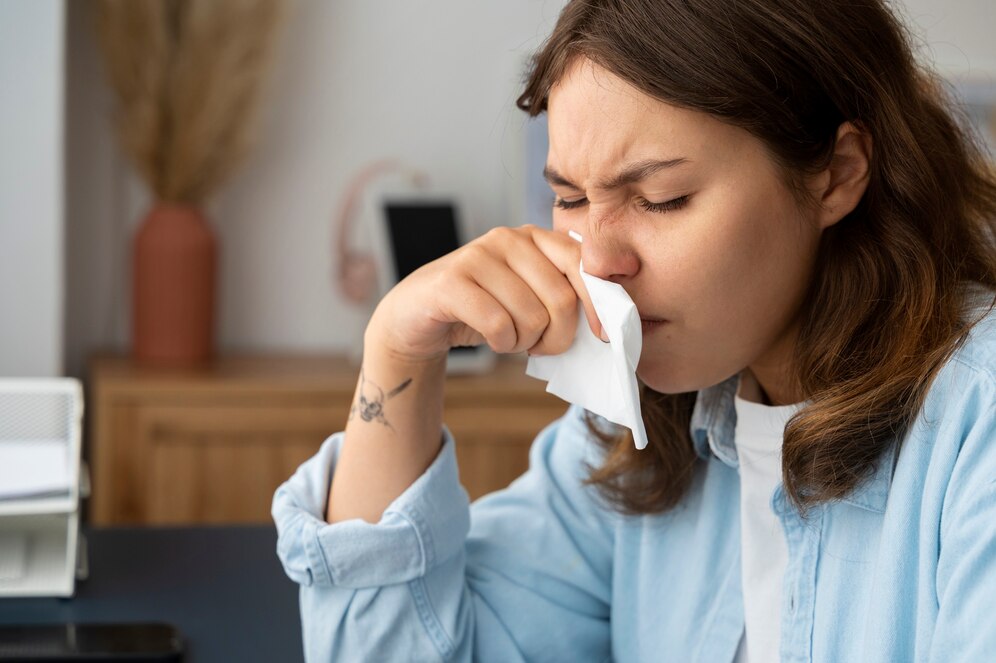
Allergy Treatment Market Overview
The global allergy treatment market is poised for consistent growth, projected to expand at a CAGR of 6–7% over the next few years. This upward trajectory is mainly attributed to the rising incidence of allergies caused by worsening environmental conditions, changes in lifestyle habits, greater consumer awareness of available treatment options, and rapid advancements in early allergy diagnostic methods. As pollution levels surge and modern living environments expose individuals to new allergens, the demand for more effective and accessible allergy treatments continues to climb.
Key Request a free sample copy or view report summary: https://meditechinsights.com/allergy-treatment-market/request-sample/
However, the market is not without challenges, as high treatment costs—particularly for advanced biologics—and limited availability of specialized therapies in underdeveloped regions can hinder widespread adoption. Despite these barriers, the market outlook remains positive as healthcare systems increasingly recognize the growing burden of allergies and the importance of early management.
Understanding the Allergy Treatment Market
The allergy treatment market includes a wide range of therapeutic products, medical procedures, and supportive healthcare services designed to prevent, control, or relieve allergic reactions. These reactions occur when the body’s immune system responds aggressively to substances such as pollen, dust mites, food allergens, pet dander, mold, or insect venom. Symptoms may vary from mild irritations such as itching, sneezing, and watery eyes to severe conditions like anaphylaxis, which can be life-threatening. Common treatment categories include antihistamines for rapid relief, decongestants to ease nasal blockage, corticosteroids to manage inflammation, immunotherapy for long-term desensitization, and biological therapies targeting specific immune system pathways. The overarching aim of allergy treatments is to minimize the frequency and severity of allergic episodes, enhance patient comfort, and improve overall quality of life by addressing both symptoms and underlying triggers.
Demand Catalyst: Role of Environmental and Lifestyle Changes
A major factor fueling the expansion of the allergy treatment market is the rapid rise in allergy prevalence linked to evolving environmental and lifestyle patterns. Global industrialization and urbanization have intensified exposure to pollutants, airborne toxins, and irritants commonly associated with respiratory and skin allergies. Urban regions, with high vehicle emissions and industrial waste, often record elevated cases of allergic rhinitis and asthma. Simultaneously, changing lifestyle behaviors—such as reduced outdoor activities, sedentary routines, increased consumption of processed foods, and altered microbial exposure—are contributing to weakened immune responses. Children in urban settings, in particular, are experiencing more allergies than previous generations due to limited contact with natural environments and altered gut microbiota. These combined factors are significantly increasing allergy cases across age groups, placing pressure on healthcare systems and driving the need for advanced diagnostic tools and effective therapeutic solutions.
Key Market Transformation: Rise of Personalized Immunotherapy
One of the most transformative trends shaping the allergy treatment market is the shift toward personalized immunotherapy solutions. Traditional allergy medications often focus on symptom management, requiring repeated use without addressing the core immune reaction that triggers allergies. Personalized immunotherapy, however, aims to reprogram the immune system by gradually reducing sensitivity to specific allergens. Sublingual immunotherapy (SLIT), administered as drops or tablets beneath the tongue, is emerging as a convenient, home-based alternative to injectable treatments. Meanwhile, biologic therapies are revolutionizing care by targeting precise inflammatory pathways involved in severe allergic asthma, chronic sinusitis with nasal polyps, and other complex allergy-driven disorders. These advanced and highly tailored therapies promise long-term relief, improved adherence, and fewer side effects, positioning personalized immunotherapy as a central growth engine for the market in the coming years.
Market Drivers
Increasing prevalence of allergies due to environmental pollution
Urbanization and greater exposure to allergens in densely populated areas
Advancements in diagnostic tools enabling early detection and targeted treatment
Rising public awareness of available allergy therapies
Expansion of immunotherapy options offering long-term management
Attractive Opportunities
Development of affordable biologics and next-generation immunotherapy solutions
Entry into emerging markets equipped with improving healthcare infrastructure
Competitive Landscape Analysis
The global allergy treatment market is characterized by a mix of established pharmaceutical firms and emerging biotechnology innovators developing breakthrough therapies. Companies are investing heavily in research to introduce safer, more effective, and patient-friendly treatment modalities. Strategic collaborations, mergers, and market expansion initiatives are common as industry players aim to strengthen their product portfolios and geographic reach. Key players operating in this market include:
- Johnson & Johnson
- Allergopharma
- Sanofi SA
- Genentech Inc.
- GlaxoSmithKline PLC
- Leti Pharma
- Allergy Therapeutics PLC
- AbbVie Inc.
- Novartis International AG
- Bausch Health Companies Inc.
- Teva Pharmaceuticals Industries Ltd
Conclusion
The global allergy treatment market is evolving rapidly as the incidence of allergies continues to rise across all age groups. Increased pollution, lifestyle shifts, and greater awareness are contributing to a surge in demand for advanced therapeutic solutions. At the same time, cutting-edge developments in personalized immunotherapy and biologics are reshaping the treatment landscape, offering patients targeted solutions with improved long-term outcomes. While cost barriers and unequal access remain challenges, ongoing innovations, expanding healthcare infrastructures, and strong market competition are expected to drive significant growth. The future of allergy care is leaning toward precision-based, patient-centric treatments that not only manage symptoms but also address underlying immune responses, setting the stage for more resilient and effective healthcare solutions.
Get Free Sample Report: https://meditechinsights.com/allergy-treatment-market/request-sample/
About Medi-Tech Insights
Medi-Tech Insights is a healthcare-focused business research & insights firm. Our clients include Fortune 500 companies, blue-chip investors & hyper-growth start-ups. We have completed 100+ projects in Digital Health, Healthcare IT, Medical Technology, Medical Devices & Pharma Services in the areas of market assessments, due diligence, competitive intelligence, market sizing and forecasting, pricing analysis & go-to-market strategy. Our methodology includes rigorous secondary research combined with deep-dive interviews with industry-leading CXO, VPs, and key demand/supply side decision-makers.
